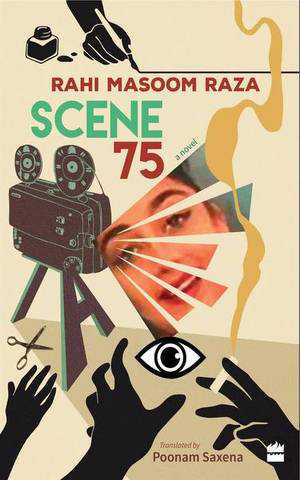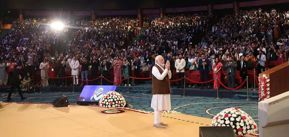
Scene 75 by Rahi Masoom Raza Translated by Poonam Saxena. Harper Perennial. Pages 214. Rs 399
Rituparna Sengupta
Forty years after it was published in Hindi, Rahi Masoom Raza’s novel, Scene 75’s English translation is making it available to a wider readership. Raza was an eminent Hindi/Urdu novelist and poet who perhaps became most famous for his script and dialogue-writing for the Hindi film and television industries (most notably, B R Chopra’s Mahabharat). Translator Poonam Saxena does a fine job of ensuring that the novel does not appear dated, while certain cadences of the original are not lost either. The effect of the compelling story is enhanced by the neat book design, and the essays that tell us more about the author and his oeuvre.
Though narratives about the sordid underbelly of the glamorous Hindi film industry have inundated popular culture, Raza’s work, penned decades ago, remains honest and fresh even today. More of a novella with two chapters, Fade In and Dissolve (terms borrowed from film editing), the book begins with scriptwriter Ali Amjad in his lonely Bombay flat listlessly toiling over scene no. 75 of his current film. Thereafter, the text unfolds like a succession of film scenes dipping into the interconnected lives of the protagonist’s friends and acquaintances.
This meandering narrative style is, as Danish Husain suggests, reminiscent of the qissagoi or other oral narrative traditions in this part of the world. With searing candour and unflinching honesty, the author paints a picture of a depraved and morally impoverished microcosm sustained by the film industry. However, he infuses it with dark humour and biting satire that saves the novel from the lesser domains of melodrama or sensationalism.
Lest one blame the devouring city, or pit the individual against the big bad world, the author repeatedly draws our attention to a spectrum of individuals and their individual and collective culpabilities. Aspiring actors, struggling scriptwriters, unscrupulous producers, unprincipled directors — no one is spared the satirist’s keen eye.
Also colourfully populating the story are incidents and characters that are as ludicrous as disconcerting. Domestic servants supply stories for blockbuster films, a wealthy lesbian and her husband woo the same married woman, a married couple finds ingenious ways to sponge off others and live beyond their income, a mother and daughter share a lover under the same roof, and a nihilist Marxist runs a profitable beggar-training workshop.
Remarkably, the novel is peppered generously with names of real actors and actresses of the time, and scandals surrounding them. However, the author momentarily enters the narrative in his own name so as to provide the standard disclaimer that mock-reassures us that all characters are fictitious and incidents bear no resemblance to contemporary society.
But even as the characters and their escapades make us wince, chuckle or marvel at their lack of moral turpitude, the author purposefully and rather skilfully, keeps drawing us back to the moral centre of the novel, Ali Amjad, who is probably a double for the author himself. Amid his uninspiring drafts of the film scene, wafts in some of Raza’s own evocative poetry that effectively captures the tragic hollowing out of a soul, and the excruciating effort involved in sheltering one’s more precious inner resources from the wretched realities of one’s compromises with the world.
But the sweep of the novel reaches further expanses — independent India’s many exasperating quirks and afflictions, whether the incessant naming and renaming of roads after ‘Big Men’, religious tension and riots, or the educated middle class’s many bigotries in disguise.
One has to only recall Bollywood’s celebrity culture, its still overwhelmingly misogynist and lacklustre scripts and the pervasiveness of religious fundamentalism in our times, to understand why this novel is so disturbingly relevant today.



























